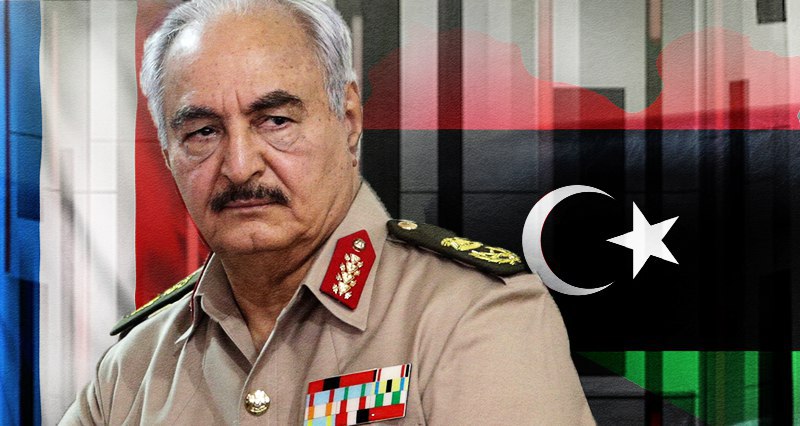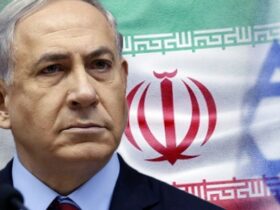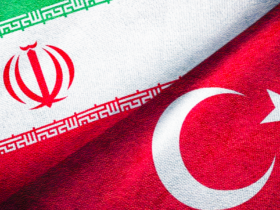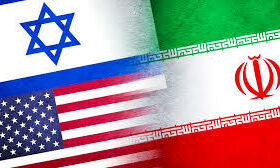For France, Libya is one of the most important countries and areas of influence in North Africa, and leader of Libyan National Army Khalifa Haftar is France’s long standing ally. Paris, while officially recognizing the legitimacy of the internationally recognized Government of National Accord (GNA) in Tripoli, prefers not to support the GNA, unlike neighboring Italy.
Despite Macron’s recent declarations “that Paris doesn’t back Haftar”, French ties with the General have a long history.
France-Libya ties
Negotiations and contacts with Haftar were conducted by France before 2011 mainly through the General Directorate for External Security. Since 2015, Paris has started to work on creating a positive portrayal of Haftar in the press, and Haftar’s vivid statements that he intends to fight terrorists were a good basis for this purpose.
Paris’s support for Haftar in 2016 is now declassified – including the fact that three French undercover soldiers were killed in a plane crash in Libya (near Benghazi).
In July 2017, Macron was trying to present an image of himself as an “objective” peacemaker and invited Haftar and Sarraj to talks – the president tried to use this, among other things, to improve his rating. Between 2017 and 2018, Paris provided military support to Eastern Libya by supporting Haftar’s offensive on Derna and Benghazi. However, according to sources in Eastern Libya, the French military did not actively participate in the battles, despite being on the front line, there were several dozen of them and they conducted military training as well as intelligence activities.
According to Le Monde , France has been training Haftar’s militia since 2015. Some sources indicate that the French Armed Forces currently have a strength of 60 personnel and are based near the main headquarters of the LNA at the Benin airport. Representatives of the management team (3 senior officers of the French General Staff) have direct contact with the Haftar residence in Rajma and are periodically there.
The secret connections of Paris with Hafar
The active line of contact of Paris with Haftar is under the control of the minister of Foreign Affairs Jean-Yves Le Drian, who started talks with Haftar during the previous post of the minister of Defence. Michel Scarbonchi was responsible for Le Drian’s approach to Haftar. From 1997 to 2004 he was a MEP nominated by the Radical Left Party the Social Liberal Party, affiliated with the Socialist Party, which was dissolved in 2017. He then left politics and became an International Relations consultant. Since 2006, Scarbonchi began to advise and work as an analyst for the African region, moreover, he regularly cooperated with Yves Drian. In 2016, Scarbonici begins a dialogue with the “Haftar clan” through the diplomatic adviser Fadel el-Deeb (with the help of journalist Roumiana Ougartchinska – who presented Scarbonici to el-Deeb), who was already directly acquainted with Haftar. “No one has ordered me to do this, even as a parallel diplomacy,” Scarbonci says. “I understood that the key to future Libya was him. When you know geopolitics you immediately understand where the strong man is. Sarraj is a puppet in the hands of the UN and Islamist militias. Haftar was fighting him against the jihadists.”
Les hommes de l’ombre de la crise libyennehttps://t.co/xn3b3uUIPl
— Jeune Afrique (@jeune_afrique) February 24, 2019
Michel Scarbonchi was invited to Benghazi to meet Khalifa Haftar. “I spent about 4 hours with him, and I realize that this guy is a little Libyan De Gaulle,” said Michel Scarbonchi. Emmanuel Macron had just been elected. At the end of May, Michel Scarbonchi publishes a column in the Huffington Post titled “Why Macron must seize the Libyan file to finally find a way out”.
Since Maсron came to power, Scarbonci has been collaborating with Le Drian, who was appointed head of Foreign Affairs. According rto the article of Jihâd Gillon (published in Jeune Afrique edition) Le Drian met Fadel el-Dib and started lobbying for support for Haftar at the Elysian Palace. A few months later, in July 2017, in La Celle-Saint-Cloud, Makron held an inter-Libyan meeting, where Sarraj and Haftar were present. Haftarbegan to be significantly legitimized on the international scene and became “part of the solution”, Le Drian notes. A year later, in May 2018, Macron initiated a second meeting, Paris actually claimed to be the main curator of the negotiation process, but the second meeting was a failure (no document was signed by the parties).
Failure Francafrique: why France is losing influence in Africa
Contacts with Haftar continued through Le Drian, who made regular trips to Benghazi. In March 2019, Haftar reproached Le Drian for not coming for a long time; the head of French diplomacy replied: “We were waiting for your victories!” A few weeks later, the marshal launched an offensive on Tripoli, and Sarraj accused France of supporting the offensive. Le Drian described Haftar as a partner in the fight against Salafi-jihadist terrorism in the Maghreb and the Sahel and called for his country’s participation in the Libyan conflict.
In a recent Opinion International article, Michel Scarbonchi wrote that France had made several errors in the region which needed to be resolved. One such ‘error’ was not involving France and the European Union in the democratic development of Libya and leaving things to the UN under the presidency of François Hollande. He called Sarraj a “puppet prime minister” and insisted on France playing a role in solving the conflict. He noted that, as the leader of the EU, France must oppose the Russian and Turkish threat in the region: “Can we organize a tripartite ‘Russia-Turkey-European Union’ meeting taking advantage of the new presidency of the European Council by Angela Merkel who, in line with the Berlin Conference, must bring the EU back into negotiations?”
The second important figure behind the Paris-Haftar Axis is politician Paul Soler (who has been called “Mr. Libya”), he himself was in Libya in 2011 and before the assassination of Gaddafi he was arrested, for which he earned respect in the Haftar clan. “He probably helped strengthen ties between Haftar and the French,” Scarbonchi explained.
Another important role in the Libyan Conflict was played by Jean-Yves Ollivier, a French businessman close to Congolese president Denis Sassou-Nguesso. Through its “Brazzaville Foundation”, he organized meetings with different protagonists of the Libyan crisis between 2017 and 2018, such as the one in Dakar in May 2018. Jean-Yves Ollivier’s primary goal is to initiate dialogue between the parties of the conflict and to become the patron of their collaboration: in August 2017, he organized a meeting between Gaddafist Béchir Saleh and Abdelhakim Belhadj, an ex-member of Al-Qaeda at the head of the Islamist party Al Watan. The meeting between the two extremes of the political spectrum is characteristic of the Ollivier method: brewing broad and bringing together as many Libyans as possible, not excluding anyone, not even those loyal to Gaddafi, whom he denounced during the Skhirat agreements in Morocco in 2015.
Jean-Yves Ollivier was also trying to set Seif Al-Islam Gaddafi as the key symbol of the reconciliation. “It’s parallel diplomacy,” said Jean-Yves Ollivier, in an interview with JA in August 2018, when asked to define his role as mediator between the Libyan parties.
French interests in Libya
Paris is interested in supporting Haftar in his fight against radical Islamism, to cut off the supply of arms and funds to jihadist groups threatening fragile governments in Niger, Chad and Mali, supported by the French Operation Barkhan. In addition, the growing interaction between France and the United Arab Emirates is helping to unite and consolidate the countries’ position on the Libyan issue.
According to INSEE data, oil from Libya increased by a factor of 2.5 between 2014 and 2018. Moreover, its proximity to Tunisia and Algeria, which are ex-French colonies, gives Libya a geopolitical importance. On its southern border are Niger, rich in uranium, and Chad, an essential base for the French military presence in Africa.
Macron’s government has been pursuing contracts for its oil company Total, which substantially raised its presence in the Libyan energy market recently, with the purchase of a 16.3% stake in Libya’s Waha oil field concessions from US Company Marathon Oil, with a value of $450 million.
Total has been present in Libya since 1954. In 2018, the Group’s production in the country averaged 63,000 barrels of oil equivalent per day, from the offshore Al Jurf field (37.5%), the onshore El Sharara area (15% in former Block NC 115 and 12% in former Block NC 186), and the onshore Waha concessions (16.33%).
Italian intervention in Libya: what are Rome’s key interests, positions, and strategies?
Conclusions
When the French president criticizes Turkey’s role in Libya it is pure hypocrisy. Today Turkey is the only country which is participating in the Libyan war on a legal basis in accordance with the memorandum on the military cooperation between Turkey and the GNA.
France’s involvement in Libya caused the catastrophic situation in 2011 and its consequences. The responsibility for today’s instability and civil war in Libya lies largely with France. Times have changed and France will no longer play the role of gendarme in Africa,” Sarkozy said in February 2008. On March 19, 2011, the French Air Force conducted its first operations against Gaddafi. The course of the interference to the Libyan region was managed by Bernard Henri-Levy. Henri-Levy is actively supporting the creation of an independent Kurdish state virtually on the contour of the map “Greater Middle East”, blaming Turkey for its “incorrect policy” toward the kurds.
The parallel diplomacy conducted by Paris is well within the framework of the postcolonial control system of FrançAfrique. “FrançAfrique” is the system of the informal connections of political, financial, diplomatic and military elites of France with the elites of African states. The system was designed as a mechanism, “designed to control French neocolonial implementation strategies”.
French analyst Patrick Pesnot wrote in his book “Les dessous de la Françafrique”: “We do not encroach on Françafric! Today, when our interests in Africa are increasingly threatened by China, it would be wrong to criticize… the traditional ties between the Elysian Palace and the leaders of the former French colonies”.
Today the threat, according to Macron, also comes from Turkey. “I have already had the opportunity to say very clearly to President Erdogan I consider today that Turkey is playing a dangerous game in Libya and is in breach of all commitments it took during the Berlin conference,” he said.
In recent weeks, relations between France and Turkey, which have not been smooth enough as it is, have been pushed to the limit because of Libya and the ongoing activity of Ankara in the Eastern Mediterranean, where Turkish authorities are trying to start drilling in the exclusive economic zone of Cyprus.
In recent debates with Eric Zemmour, the French philosopher Bernard Henry-Levy noted that the threat in Libya comes not only from Turkey, but also from Russia. “Today there is a Russian-Turkish condominium, which deals with the partition of Libya at the door of Europe. As in Syria, but with equally disastrous geopolitical consequences. We are now witnessing the consequences of the terrible retreat of America and the West. Unfortunately, Europe has not been able to accept the baton. I dream not only of a great France, but also of a great Europe that could act as a political force and pick up the torch of Western values thrown out by America”. That shows that France in Libya is playing a role of the globalist gendarme, blaming both of the GNA’s partners – Turkey and Russia.
Éric Zemmour vs Bernard-Henri Lévy (BHL) : Débat tendu sur le Covid-19, le racisme, la Libye, etc.
Comment Nous Suivre ???? ht…https://t.co/7ZhdgILJey— Planetes360 (@Planetes360) June 28, 2020
Forecasts
The tensions between France and Turkey in the Libyan context will increase, and Paris is going to return to its leading role in the EU’s foreign policy. French Foreign Minister Jean-Yves Le Drian declared on July 1 that European Union foreign ministers will meet on July 13 to “discuss Turkey” and consider the possibility of new sanctions against Ankara, reports the agency France-Presse.
“The EU has already imposed sanctions against Turkey in connection with Turkey’s drilling operations in the Cyprus Exclusive Economic Zone. There may be other sanctions,” said the head of the French diplomacy.
Sahel chaos: How terrorists are taking power in Mali, Niger and the region as a whole

















Leave a Reply